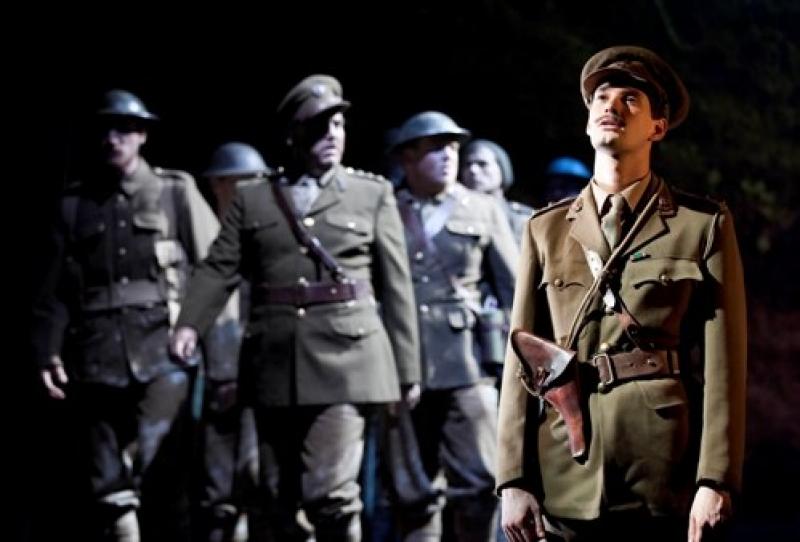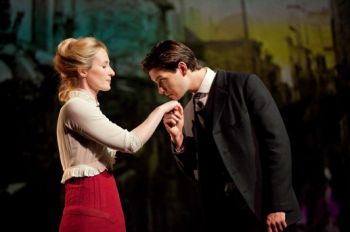Birdsong, Comedy Theatre | reviews, news & interviews
Birdsong, Comedy Theatre
Birdsong, Comedy Theatre
The staging of Sebastian Faulks's much-loved novel fails to move

Sebastian Faulks’s Birdsong has reached phenomenon status: number 13 on a recent BBC Big Read competition, part of the school curriculum along with World War One poets Wilfred Owen and Siegfried Sassoon, three million copies sold worldwide. Its lyrical, descriptive writing, dense and subtle in detail, consistently moves people to tears.
It tells of a young 20-year-old Englishman, Stephen, who, finding himself in Amiens in 1910, falls passionately in love with Isabelle, the wife of his host, before being pulled into the horrors of the war and the Battle of the Somme. Somehow he survives despite dreadful injury, spurred on by his love for Isabelle even though she abandoned him before the outbreak of war. But war inevitably hardens and disillusions him. He returns to Amiens only to learn that Isabelle has taken a German lover; he does not know that he has fathered a child, a daughter - a secret kept both by Isabelle and her sister, Jeanne.
In the novel, Faulks splits the action between Stephen and his company’s wartime experiences in the trenches and a parallel story in the late 1970s of Stephen’s granddaughter Elizabeth tracing his life through his diary. It ends on a note of redemption and reconciliation: Stephen is rescued by a German (Jewish) soldier in one of the tunnels running under German lines, Jeanne will be involved in his rehabilitation, while Elizabeth gives birth to a son, to be named John after the son lost by sapper Jack Firebrace with whom Stephen is entombed when they try to blow up the German lines.
So much for the novel. As to this stage version, writer Rachel Wagstaff and director Trevor Nunn have cut the granddaughter’s narrative, leaving us essentially with the trenches and the story of how love keeps men alive under the most extreme circumstances. Brutally put, that may sound trite. But, and I’m sorry to say it of a production that demands and delivers heroic performances from its acting ensemble, that is precisely the reaction Nunn’s three-hour production had on this spectator.
I can’t remember any World War One film or play that has ever left me quite so unmoved. Perhaps it was foolhardy to think that the scope of such a story and Faulks’s visceral literary style could find its dramatic equivalent with the same degree of conviction, especially after the shearing of its wider historical and generational implications and the limited resources of the Comedy Theatre’s stage.
 Emotions, too, which on the page can take on shivering eroticism, can so easily on stage just become awkward or faintly risible. As the principal lovers, Ben Barnes and, as Isabelle, the luminous Genevieve O’Reilly (pictured right) make a fine couple but Wagstaff’s dialogue seems unable to sustain the weight of this supposed lifelong passion. Around them, Nunn with his regular designer John Napier conjures an atmosphere that moves between pre-war Amiens to battle-torn trenches by use of projected drawings (reminiscent of the technique used in that other current World War One epic, War Horse) and some clever backcloths and platforms to represent trenches and tunnels.
Emotions, too, which on the page can take on shivering eroticism, can so easily on stage just become awkward or faintly risible. As the principal lovers, Ben Barnes and, as Isabelle, the luminous Genevieve O’Reilly (pictured right) make a fine couple but Wagstaff’s dialogue seems unable to sustain the weight of this supposed lifelong passion. Around them, Nunn with his regular designer John Napier conjures an atmosphere that moves between pre-war Amiens to battle-torn trenches by use of projected drawings (reminiscent of the technique used in that other current World War One epic, War Horse) and some clever backcloths and platforms to represent trenches and tunnels.
It’s effective enough, and the foot soldiers slog away crawling, yelping and pulverising themselves with impressive devotion. But also, to one’s surprise, it also seems slightly plodding, arch and strangely one-dimensional. Isabelle supposedly leaves Stephen because of her sense of guilt about the “affair”. Stephen too has a moment in a cathedral when he awakens to human insignificance as being like the “beat of a wing against Time”. But these moments of existential awareness are, in the main, fleeting and under-developed. Most powerful, inevitably, are the representations of the comradeship and shared fear of the men, the most genuine, powerful moments of pathos and humour being provided by Lee Ross as the laconic, music-hall-singing sapper Jack Firebrace and Paul Hawkyard as his pal Arthur.
For those coming to World War One for the first time, Nunn’s Birdsong may prove an illuminating and moving experience. Others may remember that extraordinary moment at the end of Blackadder Goes Forth of Rowan Atkinson and company going “over the top”. Not a dry eye in the sitting room. Or RC Sheriff's Journey's End, which has always led the theatrical response to the dreadful catastrophe of the trenches, or Oh! What a Lovely War, which found a new way of alerting audiences to the generals' and politicians' responsbility for sending so many young men to their deaths. I’d recommend going back to the novel. Or revisiting War Horse, still packing them in at the New London Theatre in Drury Lane.
Explore topics
Share this article
The future of Arts Journalism
You can stop theartsdesk.com closing!
We urgently need financing to survive. Our fundraising drive has thus far raised £49,000 but we need to reach £100,000 or we will be forced to close. Please contribute here: https://gofund.me/c3f6033d
And if you can forward this information to anyone who might assist, we’d be grateful.

Subscribe to theartsdesk.com
Thank you for continuing to read our work on theartsdesk.com. For unlimited access to every article in its entirety, including our archive of more than 15,000 pieces, we're asking for £5 per month or £40 per year. We feel it's a very good deal, and hope you do too.
To take a subscription now simply click here.
And if you're looking for that extra gift for a friend or family member, why not treat them to a theartsdesk.com gift subscription?
more Theatre
 The Weir, Harold Pinter Theatre review - evasive fantasy, bleak truth and possible community
Three outstanding performances in Conor McPherson’s atmospheric five-hander
The Weir, Harold Pinter Theatre review - evasive fantasy, bleak truth and possible community
Three outstanding performances in Conor McPherson’s atmospheric five-hander
 Dracula, Lyric Hammersmith review - hit-and-miss recasting of the familiar story as feminist diatribe
Morgan Lloyd Malcolm's version puts Mina Harkness centre-stage
Dracula, Lyric Hammersmith review - hit-and-miss recasting of the familiar story as feminist diatribe
Morgan Lloyd Malcolm's version puts Mina Harkness centre-stage
 The Code, Southwark Playhouse Elephant review - superbly cast, resonant play about the price of fame in Hollywood
Tracie Bennett is outstanding as a ribald, riotous Tallulah Bankhead
The Code, Southwark Playhouse Elephant review - superbly cast, resonant play about the price of fame in Hollywood
Tracie Bennett is outstanding as a ribald, riotous Tallulah Bankhead
 Reunion, Kiln Theatre review - a stormy night in every sense
Beautifully acted, but desperately grim drama
Reunion, Kiln Theatre review - a stormy night in every sense
Beautifully acted, but desperately grim drama
 The Lady from the Sea, Bridge Theatre review - flashes of brilliance
Simon Stone refashions Ibsen in his own high-octane image
The Lady from the Sea, Bridge Theatre review - flashes of brilliance
Simon Stone refashions Ibsen in his own high-octane image
 Romans: A Novel, Almeida Theatre review - a uniquely extraordinary work
Alice Birch’s wildly epic family drama is both mind-blowing and exasperating
Romans: A Novel, Almeida Theatre review - a uniquely extraordinary work
Alice Birch’s wildly epic family drama is both mind-blowing and exasperating
 The Producers, Garrick Theatre review - Ve haf vays of making you laugh
You probably know what's coming, but it's such great fun!
The Producers, Garrick Theatre review - Ve haf vays of making you laugh
You probably know what's coming, but it's such great fun!
 Not Your Superwoman, Bush Theatre review - powerful tribute to the plight and perseverance of Black women
Golda Rosheuvel and Letitia Wright excel in a super new play
Not Your Superwoman, Bush Theatre review - powerful tribute to the plight and perseverance of Black women
Golda Rosheuvel and Letitia Wright excel in a super new play
 Cow | Deer, Royal Court review - paradox-rich account of non-human life
Experimental work about nature led by Katie Mitchell is both extraordinary and banal
Cow | Deer, Royal Court review - paradox-rich account of non-human life
Experimental work about nature led by Katie Mitchell is both extraordinary and banal
 Deaf Republic, Royal Court review - beautiful images, shame about the words
Staging of Ukrainian-American Ilya Kaminsky’s anti-war poems is too meta-theatrical
Deaf Republic, Royal Court review - beautiful images, shame about the words
Staging of Ukrainian-American Ilya Kaminsky’s anti-war poems is too meta-theatrical
 Laura Benanti: Nobody Cares, Underbelly Boulevard Soho review - Tony winner makes charming, cheeky London debut
Broadway's acclaimed Cinderella, Louise, and Amalia reaches Soho for a welcome one-night stand
Laura Benanti: Nobody Cares, Underbelly Boulevard Soho review - Tony winner makes charming, cheeky London debut
Broadway's acclaimed Cinderella, Louise, and Amalia reaches Soho for a welcome one-night stand
 The Pitchfork Disney, King's Head Theatre review - blazing with dark energy
Thrilling revival of Philip Ridley’s cult classic confirms its legendary status
The Pitchfork Disney, King's Head Theatre review - blazing with dark energy
Thrilling revival of Philip Ridley’s cult classic confirms its legendary status

Add comment